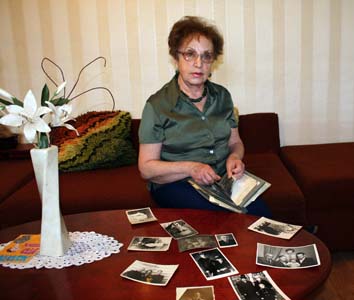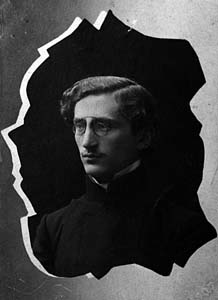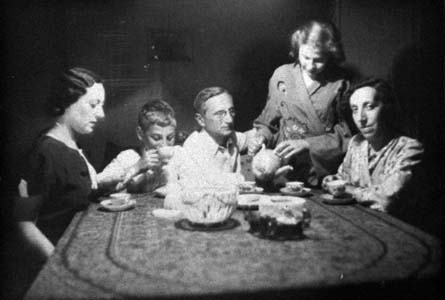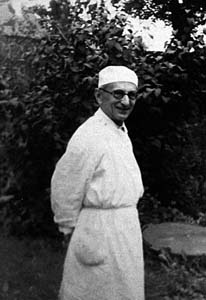

Project «Voices of Jewish settlements. Vitebsk region.»פיתוח קשרי התרבות בין העמים של ישראל ובלרוס
|
|---|
Website search |
|
MainNew publicationsContactsSite mapVitebsk regionMogilev regionMinsk regionMikhail Rivkin, Arkady Shulman
|
Memories of Larisa Grigorievna Kaim (Khvat):They say that children’s memories retain only the most impressive events… I came to a conclusion that positive things are not so well remembered because they happen rather often… We keep only the most shocking memories, as far as I can judge. When the war began I was a little less than four… Larisa Grigorievna Kaim
Larisa Grigorievna Kaim
Our family came to Vitebsk in 1929. My father, Grigory Borisovich Khvat, studied in France to become a doctor. Mother’s and father’s grandparents lived in Bialystok and this is where my mother, Eta Grigorievna, and father met. Talking about Bialystok, my parents remembered the pogroms and persecution of Jews. I did not ask for details and did not much think about the historical reasons. At that time I did not find it useful information and later wished I had. My father was a truly intelligent, cultured and educated person and, just as many intellectuals, was optimistic about he future of the Soviet Union. That was why my parents came to the Soviet Union and settled in Vitebsk. Father was a highly-qualified doctor and was busy working, while mom was taking care of us, children: me and my brother Dmitry, who was ten years older than me. He was an active and energetic type. Our family was intelligent: my father spoke five languages, mother could play the piano – she was a professional. At that time a lot of interesting intelligent people lived in Vitebsk: musicians, artists, doctors. Many of them would come to our place to spend time. In the summer of 1941everything changed due to the sudden war. People were taken aback and bewildered about what was going to happen. I remember it really well, even though I was only four: empty shops, deserted streets. Once, my mother and I entered a shop and I wanted a cake and she said: “Take it”. The shop assistant was not there. The atmosphere in the city was very awkward. Then evacuation began. My father was requested: “You are a doctor, please stay at the polyclinic and look after the property (tables and chairs), we will come back to pick you up.” They forgot about my father… And only when the city was in flames and our army was retreating, my mom took the initiative and we got on the last train, which was leaving Vitebsk. Suddenly father said he had forgotten something and had to go back. He said he would catch up with us. Mom knew him well – he was so devoted to his work: he had given his word and had to keep it. So, when he got off the train, we got off as well and followed him. Of course, he had to come back to the polyclinic to check the medicine, medical cards and the property. The city was burning, it was being bombed and it was clear nothing good was going to happen. Mother reproached him: “Children are dying while you are counting chairs and checking your medical cards.” So we got on a barge. There were two barges pulled by a small steamboat. The nurses on the first barge put on headscarves with red crosses to make it look they were taking care of the wounded. They thought it would save them. It did not have any effect - the barge was bombed. Then the steamboat’s captain declared he would not go on farther.  Grigory Borisovich Khvat –
Grigory Borisovich Khvat –university student. We started walking towards Smolensk. It was a death road. I clearly remember there was unbearable heat – plus forty degrees. We were only carrying water and the most necessary things. Father, of course, was carrying his bag with documents. In front of us there was a woman with children: around seven or eight. Every several meters she would stop and leave a child near a shrub. Apparently, she went insane and could not understand what she was doing. There were sailors who were retreating with us. Seeing the state of my parents they offered to carry me. I began shouting but on of them lifted me and so we went on walking: one of my arms was holding the sailor’s neck, the other – my mom’s. When we reached Iliino, which is today a town of Zapadnaya Dvina in Tverskaya region, we made a decision to stay. We were allowed to stay in some house. Today, after living a long life, I have reached a conclusion that people used to be kinder back then. Father began working. Very soon, however, Germans invaded the town. In September, 1941, we were all taken to a ghetto. There were a lot of local Jews but they were in better conditions – they at least had some minimal savings. It was a pitiful life – struggling to survive, living on the edge… I remember how my brother Dima was beaten and humiliated. Local Nazi policemen were often even worse than Germans. Once, I was with my mom, a German came up and gave me a chocolate bar. I forgot what chocolate was. A policeman immediately informed the German I was Jewish. I did not take the chocolate and hid behind my mom, paralyzed with fear.  The Khvat family.
The Khvat family.
Many times Dima was forced to do physical work. He was 14, still a teenager, with acute self-dignity. He would say: “I will not do this”. Mom volunteered to go instead of him and saved him several times. In other cases he was beaten. Everyone was beaten. Father provided medical help to the ghetto residents. Sometimes Russians came from Iliino to ask for his help and would leave some food as payment. We survived owing to that. Everyone around did not believe I would survive because of starvation and disease. We found out that in the local woods there was a partisan brigade, headed by Pavlovich Pavel Pavlovich. Even though I was small I remembered such an unusual name. After the war I found out that partisans had their spies in the commandant’s office. At night they would take my father to help partisans. They even looked for the medicine he asked for. Once father was taken to help a famous Moscow actor, who was in that partisan brigade – he had been wounded. Father went there – one of his legs had to be amputated. He disinfected a regular saw and cut off his leg. Anesthesia was impossible to find, so he gave the patient a lot of alcohol until he lost consciousness. As a matter of fact my brother read about this episode in some book later – the book mentioned the operation had been performed by a student. My brother wrote a letter of protest to the publishing house, but they let him know Jews were not supposed to be heroes… That actor could not stay in the shelter any longer, so he was put up in a house in town. Once, mom was called to the commandant’s office. There were two long queues – one for those who could speak German, the other – for those who could not. Mother was in the one for German-speakers. A woman came up to her and said: “Please, tell the commandant I need to see him.” Mother asked: “What would you like to ask?” The woman told her she had a wounded partisan hiding in her house and so on… Mother said: “Of course, you can go home, I will do everything.” Obviously, she did not tell the commandant anything but when she came back she was very frightened. Apparently the woman succeeded in meeting the commandant and the following morning the whole ghetto was taken to be executed on the bank of the Dvina. The temperature was minus forty and people were very lightly dressed. There was only partial execution on that day – mom said that people were burnt alive in a barn. One girl, very pretty, was let out of the barn and she was running, in flames. She was shot by a policeman.  Grigory Borisovich Khvat –
Grigory Borisovich Khvat –doctor. Days were short. In the evening hay was brought to the commandant’s office. For some reasons they put the execution off until the following morning. Due to my age I could not entirely understand the feelings of the people that night. However, I felt the atmosphere in the barracks. Everyone was saying goodbye to each other. A Russian woman came to us – my father had helped her – and said: “I cannot save everyone, but you can leave Larisa and Dima with me. They will become my children.” Dima was against, so was I. Father sent my mom to a pharmacy and told her to get certain medicine. It was poison. “We will commit suicide, - he said. – It is impossible to spend time here thinking whether they will burn or shoot us”. So she went. The pharmacist was a local fascist. He said: “Do you want an easy death, you Jew? No way! You will suffer.” Mother came back with nothing. “Then we will wait for our fate”, – said father. Naturally, no one was sleeping, it was horrible: people went hysterical. At 6 a.m. we heard shooting and started preparing ourselves for the worst. Suddenly we heard voices: “Partisans, partisans!” It turned out that the hay for the commandant’s office had been brought by the partisans who had connections to the Red Army. It was a planned operation. We were saved. On that night my parents went completely grey. During the operation of the ghetto liberation one of the Germans was wounded. He was bleeding and my father started helping him. The Jews told my dad: “What are you doing? He intended to shoot your family and you are saving him!” But dad was a genuine doctor - Asclepiades' Oath was not just an oath, it was his existence. Father stayed in Illino and worked as a doctor; we were evacuated to Chuvashia. When Vitebsk was liberated, father returned there and called us back. We now lived in a morgue. But it was life… I actually did not realize it was a morgue, and found out about it later. Back then I would say: “It’s great – you can pour water onto the floor, it freezes and you can slide!” Father worked until the 1970s. He died in 1976. When he was already retired, people still would come and ask for help. I studied at the Institute of Pedagogy and later worked at the Biology Department of Vitebsk Pedagogy Institute (today Vitebsk State University). Larisa Kaim’s videointerview |
|||
|
|
Jewish settlements in Vitebsk regionVitebsk • Albrehtovo • Babinovichi • Baran • Bayevo • Begoml • Beshenkovichi • Bocheikovo • Bogushevsk • Borkovichi • Braslav • Bychiha • Chashniki • Disna • Dobromysli • Dokshitsy • Druya • Dubrovno • Glubokoye • Gorodok • Kamen • Kohanovo • Kolyshki • Kopys • Krasnopolie • Kublichi • Lepel • Liady • Liozno • Lukoml • Luzhki • Lyntupy • Miory • Obol • Oboltsy • Orsha • Osintorf • Ostrovno • Parafianovo • Plissa • Polotsk • Prozorki • Senno • Sharkovshina • Shumilino • Sirotino • Slaveni• Smolyany • Surazh • Tolochin • Ulla • Verhnedvinsk • Vidzy • Volyntsy • Yanovichi • Yezerishe • Zhary • Ziabki • |
Main |
New publications |
Contacts |
Site map |
Vitebsk region |
Mogilev region |
Minsk region |